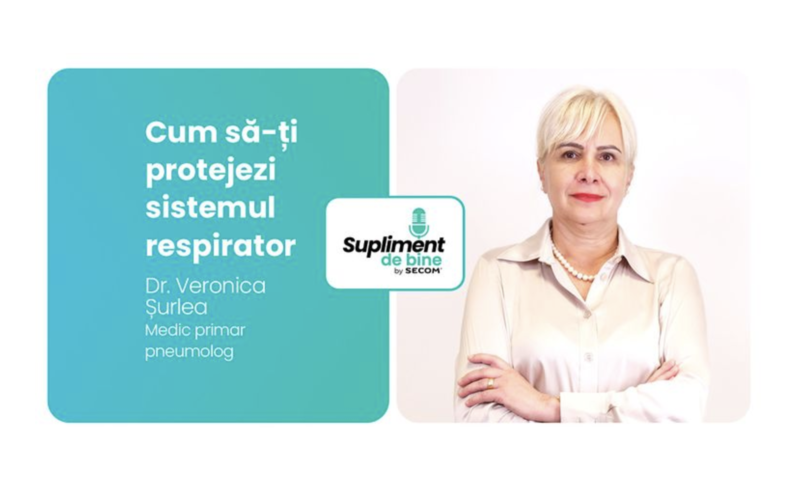This year’s flu and cold season is early and it promises to be intense. SARS-CoV-2, which has become a seasonal virus, will continue to circulate, and the beginning of schools and kindergartens has already led to an increase in respiratory infections of all types, as the statistics provided by the Ministry of Health already show.
Dr. Veronica Șurlea, primary pulmonologistPhoto: Secom
In the educational podcast “Suppliment de Bine” by SECOM, from September, “How to protect your respiratory system” was discussed, and the special guest was Dr. Veronica Șurlea, primary pulmonologist.
You can find the entire discussion between Dr. Veronica Șurlea and Dr. Oana Trifu Bulzan here:
Below, find some of the pulmonologist’s recommendations to prevent respiratory infections, but also to prepare and treat yourself as efficiently as possible this flu season.
1. Take steps to boost immunity
Good immunity to maintain through a lifestyle without excesses, where we take care of the diet, which should be rich in vegetables and fruits, take care of hydration and avoid the consumption of cold/acidic drinks in excess. It helps administer a combination of C vitamin,D and zinc, vitamins with a well-defined rolein cellular immunity, but also in its maintenance. “A vitamin supplement helps us pass more easily and have a much better evolution after an episode of respiratory infection,” says the pulmonologist.
2. Act at the first signs of a cold
If signs such as: runny nose, sore throat, respiratory discomfort appear, act as soon as possible. “It is important that in the first 24-48 hours we act quickly so that we have a greater flow of leukocytes, which are the body’s defenders, so that we can reduce the inflammation, we can liquidate the virus or bacteria,” the pulmonologist details.
The goal of rapid intervention is to reduce inflammation. Its persistence is complicated over time with bacterial infections, that is, we can become superinfected with our own bacteria with which we coexist.
The onset of a respiratory infection is different from person to person, but the treatment must be the same: we drink hot tea, stay indoors, administer a cough syrup, make aerosols, even with saline, pulmonologist Veronica Șurlea also recommends.
3. Avoid large temperature differences
Our immunity also means ensuring a quality mucus, i.e. a mucus that is in sufficient quantity, so neither too much nor too little, and contains those cellular elements that help us create a protective barrier, so that the lungs do not all the residues from the air arrive. “When the cold season begins, any difference in ambient air temperature means stress and a much harder work on the part of the respiratory epithelium that will produce a greater amount of mucus, which can be seen when our nose starts to run or to feel certain secretions at the level of the throat, as further on, if things are not well processed at the upper level of the nose-throat, it is normal that this information will be passed on, that the bronchial epithelium must work hard and then the secretions appear at the level of the lower respiratory tract, which will have cough as a symptom”, says Dr. Veronica Șurlea.
The specialist recommends avoiding large temperature differences. Even if it’s cold outside and we get dressed, the air we breathe will still be at a lower temperature than our body temperature. And then we must avoid staying very long in an environment with very cold air.
4. Treat the cough according to the type
A dry cough is, in fact, the beginning of a respiratory infection or contact with an allergen that is in too high a concentration in the air we breathe. For allergiessuch as ambrosia, which is still present in many areas of the country,specific products are recommended.
“If it’s about a dry cough, at the onset of a respiratory tract infection, we usually have to initiate a treatment with a mucolytic, because we have to fluidize that mucus that is in greater quantity, but which still cannot be expectorated. Later, this dry cough from the onset of respiratory infections will turn into a productive cough, because the bronchi try to eliminate this excess mucus. At the end of a respiratory infection, we can also have a residual cough, which can be of a dry, irritating type, and then we intervene with a product that is strictly aimed at this type of dry cough”, is the doctor’s advice.
5. COVID becomes a seasonal virus, which is treated like anything else cold
The SARS-CoV-2 virus will be present in all seasons, reminds the pulmonologist, who has already faced many cases in the office. Keep in mind that when the cold season begins, the protective barrier begins to decrease in the respiratory tract due to temperature differences. “There remain, as recommendations, the wearing of the mask in closed spaces and in the community, compliance with the rules of personal hygiene and the treatment that we must initiate as soon as possible. For SARS-CoV-2, the treatment is the same as for any respiratory tract infection”, is the specialist’s advice.
“We have to get used to the fact that this Covid will be part of our lives. It will be present in any season, however, we expect the incidence to increase in the cold season”, says Dr. Veronica Șurlea.
Article supported by Secom


